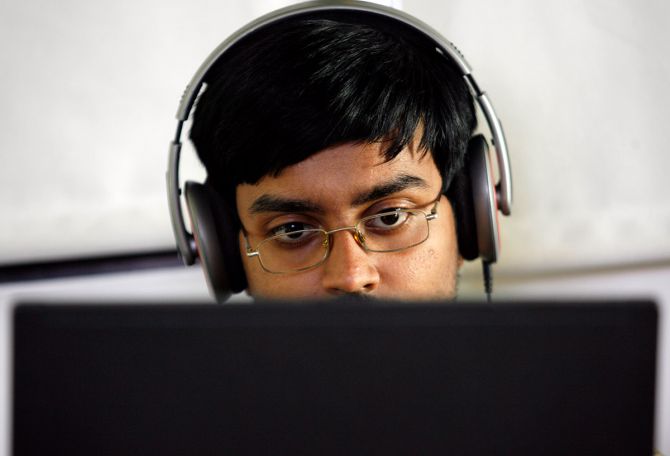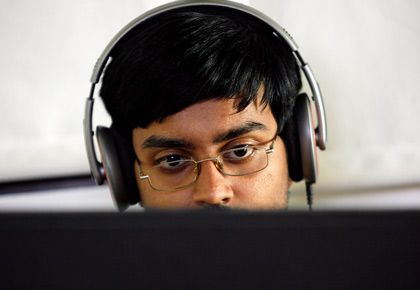Listening to loud music, indulging in deep sea sports or even a family history of deafness may induce early hearing loss in young adults, warns Dr Aditi Sinha.

Children, teens and young adults go through a common problem of hearing loss.
According to a recent survey by the Centers for Disease Control, many young adults have hearing loss, even in their 20s, and most don’t even know it!
Statistics from the CDC show that about 12% of adults ages 18-39 report difficulty following a conversation amid background noise, and about 6% experience ringing in the ears, known as tinnitus.
At least 20 per cent of people in their 20s already have some degree of permanent nerve-related hearing loss or ringing in the ears (tinnitus), and their condition will only get worse over the years.
According to the study, approximately 24 per cent of people aged 20 to 69 who report having 'excellent' hearing have measurable hearing damage!
What's causing hearing loss in your 20s?
While you might think that high levels of workplace noise are the most common cause of hearing loss in young adults, more than half of those with hearing loss are not.
So, what else is causing hearing loss among young adults?
Many of our day to day habits and activities causes hearing loss.
Some of the most common causes are:
1. Noise
Noise induced hearing loss is the leading causes of hearing loss in young adults. It is the result of over exposure to dangerously loud noises.
A person who goes through this condition has problems hearing high pitched sounds properly.
They can typically hear voices normally but struggle to articulate with clarity what the other person just said.
The problem is most prevalent in spaces with a lot of competing background noise.
This damage can occur from leisure activities like attending loud concerts or sporting events.
Noise pollution in our cities can also lead to noise induced hearing loss, examples being screeching bus brakes, honking horns, and construction sites in the neighbourhood with drilling/ sawing machinery all add to the noise levels around us.
Unsafe listening practices by youngsters also pose a greater risk to their hearing capacities.
Many use earbuds or headphones to drown out annoying background sounds.
As the distracting sounds get louder, they tend to reach for the volume controls, cranking it up to unsafe levels, again leading to early hearing loss or tinnitus.
If you listen to music with higher volumes it is likely to damage your hearing, the longer you are exposed to it.
Because noise-induced hearing loss is often gradual, young adults who have it may be unaware of it for several years.
2. Otosclerosis in young adults
Another one of the most common medical causes of hearing loss in younger to middle aged adults is otosclerosis, an abnormal bone growth and fixation of the 3rd bone (stapes)in the middle ear.
The stapes does not normally transmit sound to the inner ear when you have otosclerosis because of abnormal bony deposits that form around its base.
These deposits form gradually over years. As the deposits build up, the hearing worsens. These bony deposits frequently occur in both ears.
Low-pitched sounds are usually the first to become difficult to understand. You may even hear ringing or buzzing in your ears or dizziness or imbalance.
3. Infections/inflammation
Common viruses that can cause acquired hearing loss include measles, chicken pox, and mumps.
Bacterial and fungal infections of the ear or associated with nose, sinuses or throat are common too, causing varying degrees of deafness.
These can cause damage to nerve of hearing, to brain or can cause recurrent middle ear infections leading to perforated ear drum, damaged bones in the ear, thus presenting with recurrent ear discharge and varying degrees of hearing loss.
Patients with Covid-19 infections have also reported deterioration of hearing post infection and/ or sudden sensorineural loss of hearing
4. Trauma
Head injuries during contact sports like boxing or road traffic accidents or trauma to face or ears due to slap injury, blunt objects or sudden water splash during water sports can cause eardrum rupture or dislocation of bones in the middle ear.
Injury due to self-cleaning of ears with Q-tips or sharp objects like pencils, pins, forceps also contribute to hearing loss.
5. Barotrauma
Pressure induced effects during deep sea sports, scuba diving or frequent air travel while suffering from cold/coughs in poorly pressurized air cabins can damage the inner ear or can cause fluid build up in the middle ear leading to varying degrees of deafness.
6. Heredity or genetic factors
Family history of deafness on maternal or paternal side e.g. Otosclerosis, Usher's syndrome, Pendred's syndrome etc. can cause deafness in young adults too.
70 per cent of all the mutations that cause hearing loss are non symptomic, meaning the person does not have any other symptoms other than deafness.
The remaining 30 per cent mutations that cause hearing loss are syndromic which means the person has other symptoms besides the hearing loss. For example, there are some people with hearing loss who are also blind and can't see properly.
7. Smoking/Alcohol/Drug abuse
Damage is caused by these chemicals to sensitive cells in the inner ear, auditory nerve and the brain leading to irreversible sensorineural hearing loss.
8. Ototoxicity
Reaction to commonly used antibiotics or pain killers used routinely in treatment of common medical conditions -- examples: streptomycin, aspirin-- chemotherapy drugs can cause temporary or permanent hearing loss which may be associated with giddiness/vertigo and tinnitus as well.
9. Impacted wax
Due to poor ear hygiene and frequent use of Q tips/earbuds/headphones, over a period of time, wax is collected in your ears.
This wax can block the ear canal partially or totally to cause temporary deafness and associated with ear pain, ear block and itching.
10. Congenital
Deafness from birth or deafness which is gradually progressive in early adulthood can occur due to prematurity at birth, low birth weight, CMV or Herpes or other viral infections in mother during pregnancy or during newborn's ICU stay.
11. Tumours
Tumours like osteomas which are bony outgrowths blocking the ear passage or acoustic neuromas that involve the nerve of hearing can cause deafness too in rare cases.
12. Medical conditions
Underlying medical conditions like Type 1 diabetes, chronic kidney disease or cancers may also rarely affect hearing in young adults in their 20s.
Protecting your hearing
Whatever your age is, it is critical to be aware of the risks to your hearing health and to protect your hearing.
If you work in a noisy environment, wear hearing protection whenever it becomes too loud, and make sure you know how to properly wear your hearing protection.
Bring foam earplugs to leisure events like concerts or sporting events, and encourage your friends to do the same.
It's too loud if you have to yell to be heard by the person standing next to you, and you're all endangering your hearing health.
Remember the 60/60 rule when it comes to listening to music safely.
It is recommended that you listen for no more than 60 minutes at a time.
Listen to your music at 60% volume and resist the urge to blast it, because doing so will send these dangerously loud sounds right into your ear canal, damaging the delicate cells of the inner ear and leading to permanent hearing loss.
Swimming without ear plugs is not recommended.
To attempt self-cleaning, do not insert Q tips or other foreign objects into your ears. As much as possible, avoid using headphones and earbuds.
Keep an eye out for prescriptions and over-the-counter medications.
Hearing Loss Treatment
Hearing loss caused by nerve damage is a permanent condition, which is why it is critical for young people to protect their hearing.
If a young person has a family history of early hearing loss, is frequently exposed to loud noises, experiences ringing in the ears, or struggles to hear the right words in conversations, s/he should make an appointment with their nearest ENT specialist for a physical checkup and hearing test (audiometry).
Dr Aditi Sinha is a consultant ENT and head and neck surgeon at Masina Hospital, Mumbai.

Disclaimer: All content and media herein is written and published online for informational purposes only. It is not a substitute for professional medical advice. It should not be relied on as your only source for advice.
Please always seek the guidance of your doctor or a qualified health professional with any questions you may have regarding your health or a medical condition. Do not ever disregard the advice of a medical professional, or delay in seeking it because of something you have read herein.
If you believe you may have a medical or mental health emergency, please call your doctor, go to the nearest hospital, or call emergency services or emergency helplines immediately. If you choose to rely on any information provided herein, you do so solely at your own risk.
Opinions expressed herein cannot necessarily provide advice to fit the exact specifics of the issues of the person requesting advice.











 © 2025
© 2025